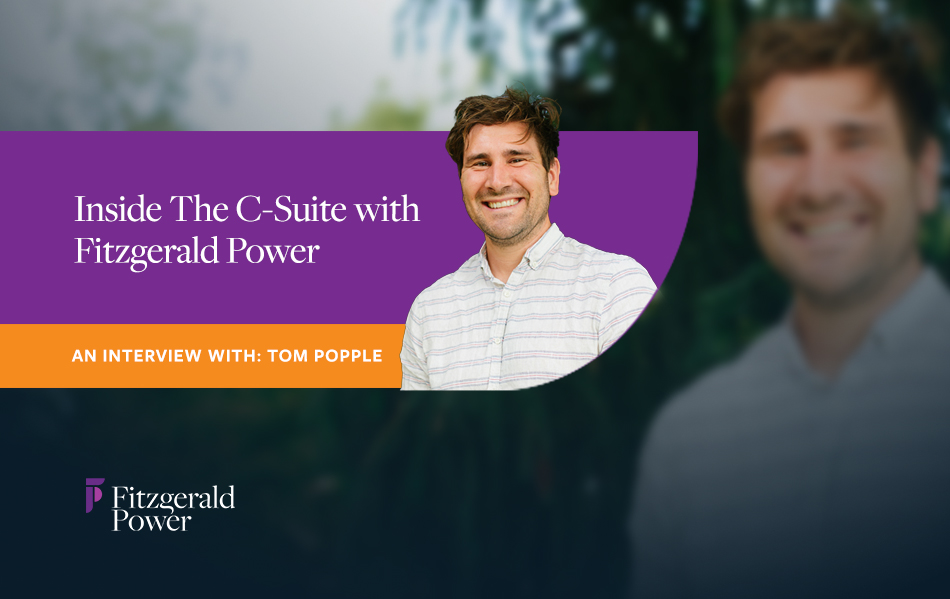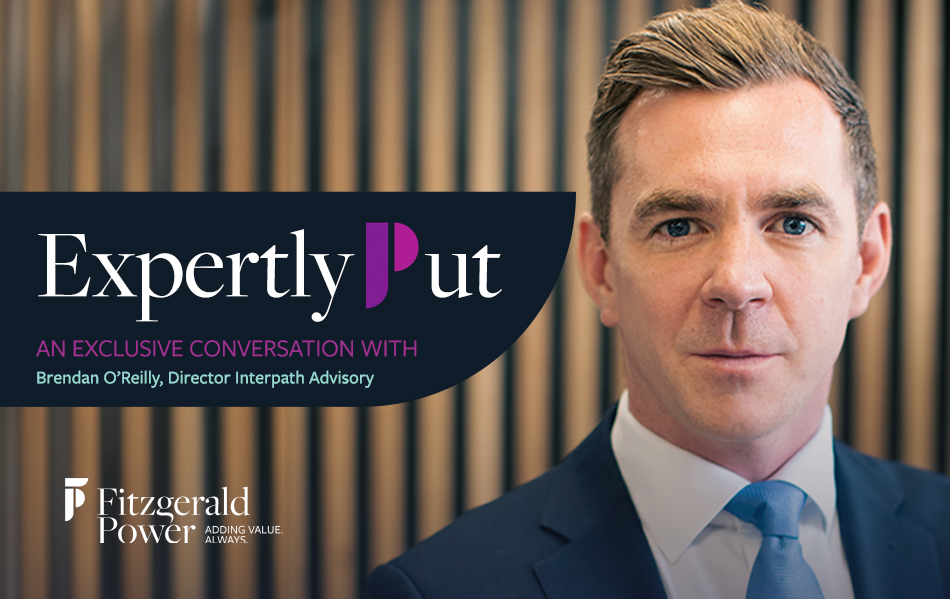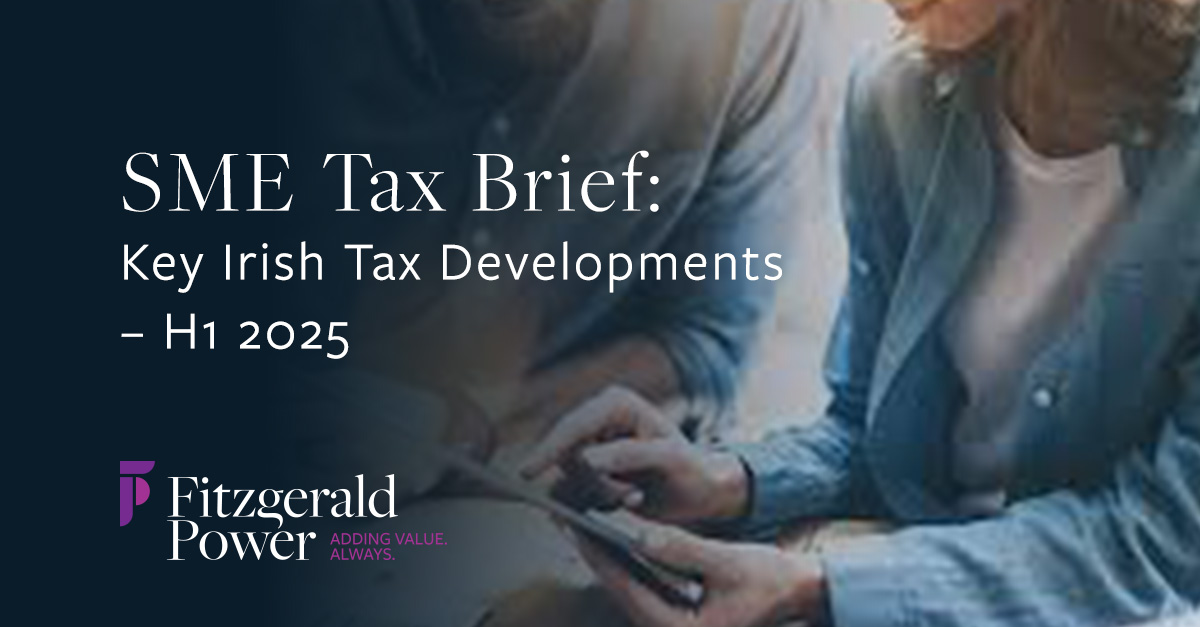“Transcendence happens when you think about sustainability as an opportunity, not a risk”
In Fitzgerald Power’s interview series, we’re speaking to people with different perspectives who feel they can offer more to the workplace, from the water cooler all the way up to the C-Suite.
So much about a business goes on behind the scenes. A myriad of factors go into building a company, successfully selling a product and marketing a brand. But increasingly, there’s one issue that’s been at the crux of consumer behaviour – not how good the product or service is, or indeed how it’ll change someone’s life, but how good it is for the planet.
Sustainability, as we’ve all come to know, is far more than just a buzzword – it is the number one deciding factor for a growing cohort of consumers, particularly the up-and-coming generation. Comprising roughly a quarter of the world’s population, Gen-Z consumers’ motivations are markedly different from previous generations—they’re less brand loyal, the first digitally–immersed cohort in history, and they currently command a whopping $360 billion in purchasing power. As well as that, they’re also the driving force for a gargantuan pivot in consumer priorities; a recent study by NielsenIQ found that 78% of US consumers say that a sustainable lifestyle is important to them, and, according to the World Economic Form, some three-quarters of Gen Z consumers now make their buying decisions based on sustainability, not brand name.
Understanding this wholeheartedly is Tom Popple, the founder of BE IMPACTFUL. BE IMPACTFUL helps organisations design and deliver their climate, nature and community impact strategies. “Organisations can waste a lot of money trying to create impacts that are meaningful to them,” he says from his Laois home via Zoom, a copy of Greta Thunberg’s ‘Skolstrejk för Klimatet,’ neatly out of frame. “And I’ve seen that in philanthropy as well as corporate sustainability settings. And there’s just a better, more efficient, more sensible, more impactful way of designing impact programmes. And so that’s what I decided to do: to be rebellious and break out of the system. But, not all advisors have the same mindset to drive for impact; some realised there’s actually a whole ton of money to be made. Unfortunately, I see too many organisations profiting unjustly from providing impact services to protect and restore our world, selling their version of the truth to brands. So I decided to go solo and create a little kind of nebula around myself with like–minded people to go in and work with these organisations, who in their hearts want to do a good thing, but they don’t know how to do it effectively.”
Popple grew up in “a normal, working–class family,” in Peterborough, the son of a nurse and a policeman. At school, he grew fascinated with maps and Geography and the interconnections within the subject between science, humanities, economics, business and religion. Few of his classmates went to university, but he travelled to Sheffield to study Geography, despite having no career plan. “I learned very quickly that there are people who win out of creating environmental damages and those who lose,” he says. “And the ones that lose are the ones that are least prepared, with the least access to resources and tools. And so I had this kind of burning justice that I wanted to kind of create and enable – how can you get people with money, with influence, to actually have a positive and regenerative impact on our world?” This passion continues today, over the last decade, he’s built voluntary impact financed solutions for major global brands including Sky, Accenture, Marks and Spencer, Taylors of Harrogate, PwC, Deloitte, BBC and many more. Tom is also a Board Director of GIY and Hometree and Founder of the Climate Cocktail Club, an organisation which includes Mary Robinson within its ranks.
When asked about connecting organisations with social causes, and what the right way to make those connections are, he mentioned many reasons. “It all comes down to people,” he says. “So as much as we think organisations are strategic, and we read their sustainability reports, and we see these plans mapped out, they’re all designed by people. The whole world is people. And so, when they sit down and really think about what they want to support, the first element can be their personal experiences – say if someone in their family had cancer, then they may support a cancer charity, or if they care deeply about nature, then they might explore link-ups with the WWF. This can be meaningful, of course, but its far from strategic or impactful. It’s important to understand personal drivers as part of the process and value them appropriately.
“The second is risk. It’s really important for big brands not to do anything that would jeopardise their organisation, particularly anything that would create reputational risk. And so they sit down and go, well, here’s what we want to achieve – and that can feel nice and good, but it’s really down to a few choice questions: What are we actually measuring? What are we reporting on? What are our material risks? What’s our impact on nature, climate and community? We’re really comfortable with financing that and getting that data out and what we’re doing, but what’s our real footprint? What should the proportional impact be, what negative impacts should be reduced and when? Who should we choose and why, what value does it create, to whom, and where? So it’s an impact data and science–based approach, and I’ve seen that a lot in climate – for example, the Science–Based Targets Initiative will be one of those where organisations want to align with the big global climate agreement – Paris and Net Zero. And so organisations want to follow that because it’s gained popularity, relevance, and integrity – it provides a meaningful framework for action.
“And then the final approach. You do kind of come across some wonderful free radicals in the world who understand that the world needs a restorative approach. In the way that you’re delivering more than just cancelling out your negative impacts. And so they lean in and think about who can deliver us the greatest impact, which can be really transformational. And so in that cohort of people, they think about the brand, not through the risk lens, but through an opportunity lens. And then your brand goes through this transcendence where it is no longer just known for its product or service, but for its positive impacts. And that’s the real winning space. It’s not a small project, either – I have clients who have 10, 30, and 100-year plans based around really transforming this space.”
The importance of investing back into society for organisations is paramount today, in particular for those looking for investment or to sell their business, as the concept of sustainability and regeneration grows more valuable for investors. But is it a non-negotiable? “All businesses have a social impact, whether explicit or not,” Popple says. “They are made up of people at the end of the day, and their customers are people, as too are their suppliers and stakeholders. Having a strong social purpose and mandate to create positive and reduce negative impact provides a strong foundation for success, whether that’s for continued operations, sales or seeking investment. The challenge is that tools for analysing that impact and converting it to financial risk or opportunity are lacking. So too is comparability, what does positive or good look like? It is critical for all organisations to:
- Know, measure and report negative and positive impacts (“Foot Print”).
- Engage, listen and value your own people (“Brain Print”) AND your customers/communities’ (“Finger Print”).
- And ask why always – why are we doing it, why should we do it? etc. This forms the basis of a coherent, concise and culture-specific impact strategy (“Blue Print”).
“I operate in strategic impact programmes that aim to deliver restorative and regenerative impacts with measurable business, societal and planetary metrics. It’s far beyond traditional philanthropy and CSR, and arguably sustainability. So is it non-negotiable? For me, yes, because investing in society and creating positive impacts is the reason for any organisation. Doing it properly is not throwing a few euros into the Christmas Card for local charities, it’s building a programme for impact and partnerships to do that.”
For those looking to create impactful, long–lasting change in a genuinely positive way, Popple insists that organisation leaders must be absolutely clear on what their negative impacts are, and avoid baseless greenwashing – purporting to the consumer that their product is more sustainable than it is – at all costs. “I see it in the cosmetics industry a lot,” he says. “So many nature–based products that say their ingredients are 90% natural. Of course, it is, because most of the product is water, and the final 10% is made up of chemical compounds. You can’t just whack a label like that on things anymore – people are too smart for that now.”
The good thing is, though, that there are immediate questions about sustainable business practices one can ask oneself, even when they don’t know where to start. “Measure is the very first thing you should be doing,” he says. “Like you have to get your head around the data and know what you’re doing. And with that, data becomes a currency internally, because you can use it to set goals, objectives and KPIs. So measurement is absolutely fundamental. In some organisations, there are legal requirements for them to do so, but that is the first thing I get them to do.
“The other thing that I do when I work with an organisation is speak with as many people as possible, the CFO, the board, the sales team, the market unit leaders, those on the ground delivering the brand – because they’re the people that represent the organisation on a day-to-day basis. Every day, people, working-class people, get forgotten in businesses, and it’s people who make companies – people, not the product, not the service. And so you can’t start a sustainability programme or anything at all, without realising that your company is made up of people who have perspectives, hopes, dreams and everyday lives. So you need to get their thoughts on paper, and as soon as you crack that, you’ve activated the however many people who work for you on one project, and they will give you the solutions and ideas for what you should do because they understand your company best.
“Then it’s all about asking yourself why,” he says. “I was at an event late last year with a very big global brand, and the CEO asked aloud, “What should I care about? What should I do?” And the response was: “Do less,” to which he replied, “I can’t. I have competitive pressures.” And I understand that answer, too. I have friends from home who have no idea what I mean when I mention the word sustainability or science-based targets, or frankly, care about the same issues. But to get this, really get this, we have to realise that it’s kind of the wrong questions we’re asking. Put yourself into the shoes of those affected most by climate change. And think about the psychology, sociology and all of the interconnecting relationships between them, then you’ll understand. It’s Geography.”
For more information on Tom and BE IMPACTFUL blog, check out his website here.





